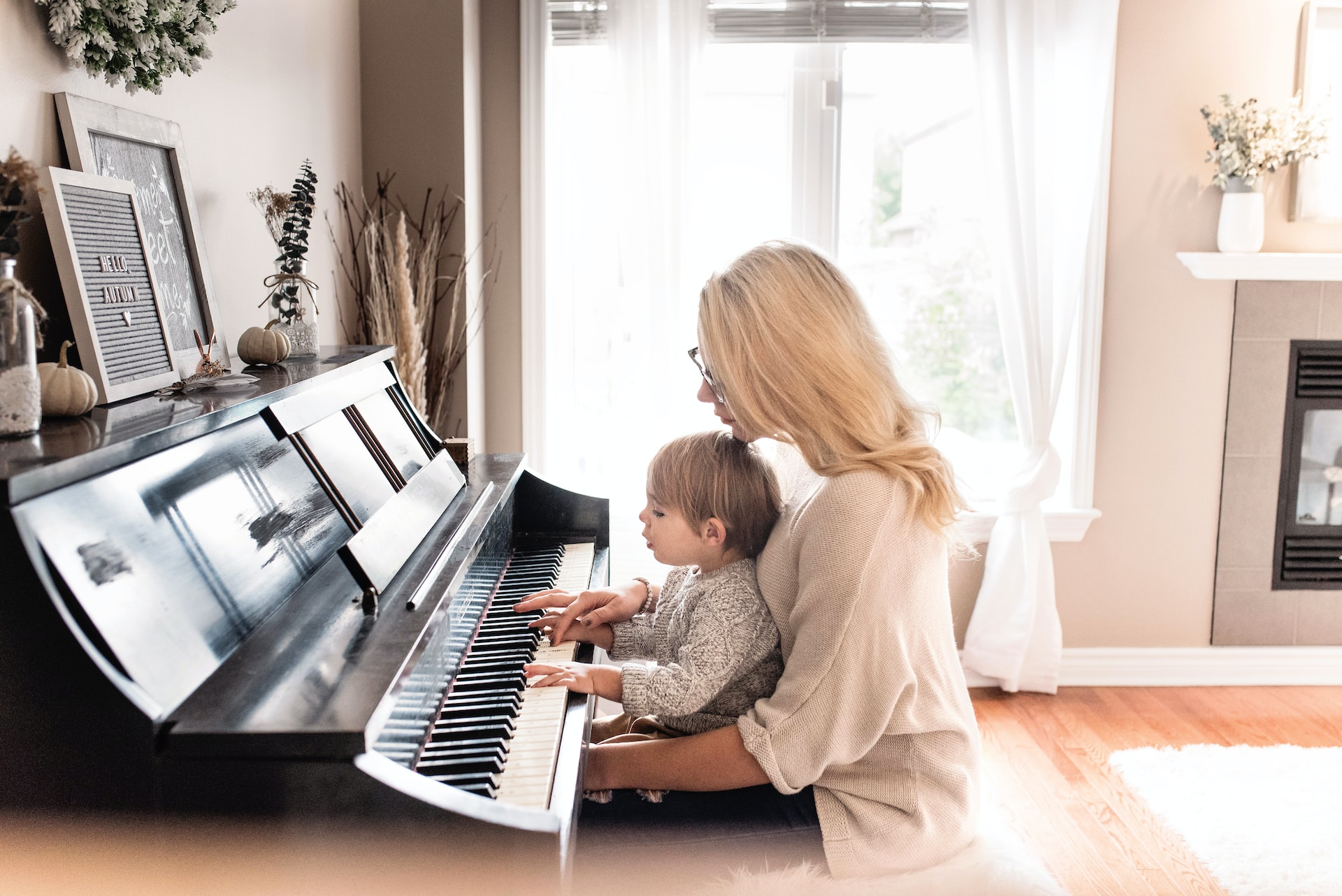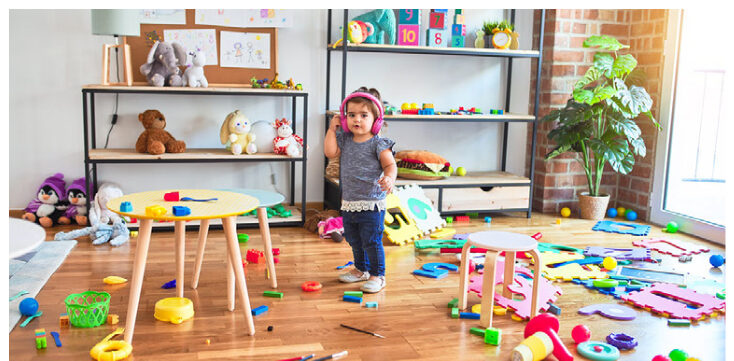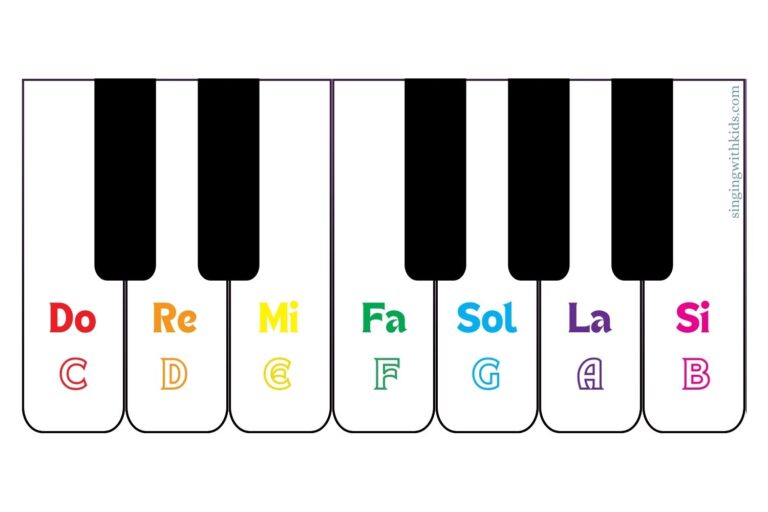Every Parent’s Guide to Early Childhood Musical Education
Table of Contents
Making Music Together: How Every Parent Can Help Their Child Love Music
As a singing teacher, I meet lots of parents who worry about their musical skills. They often ask, “Can I still help my child love music, even if I’m not a good singer?” The answer is a big, heartwarming “yes.” Today, I want to share with you how every parent can play a special role in their child’s musical journey, no matter how they sing or play music.
Let’s Talk About Singing to Our Kids
Some parents are scared that if they sing out of tune, it might stop their kids from being good at music. This idea can make some parents shy away from singing or playing music around their children. But guess what? When you sing to your child, it’s not about hitting all the right notes. It’s about sharing a moment, feeling close, and having fun. Music for little ones is all about playing with sounds, feeling the beat, and enjoying the time with you. So, when you sing a lullaby or a playful song, no matter how it sounds, you’re helping your child’s love for music grow.
Kids love to hear your voice and feel your happiness when you’re singing or playing music, even if it’s not perfect. It’s how they start to love music themselves. And it’s not just about singing; it’s about making music a fun part of your lives together.
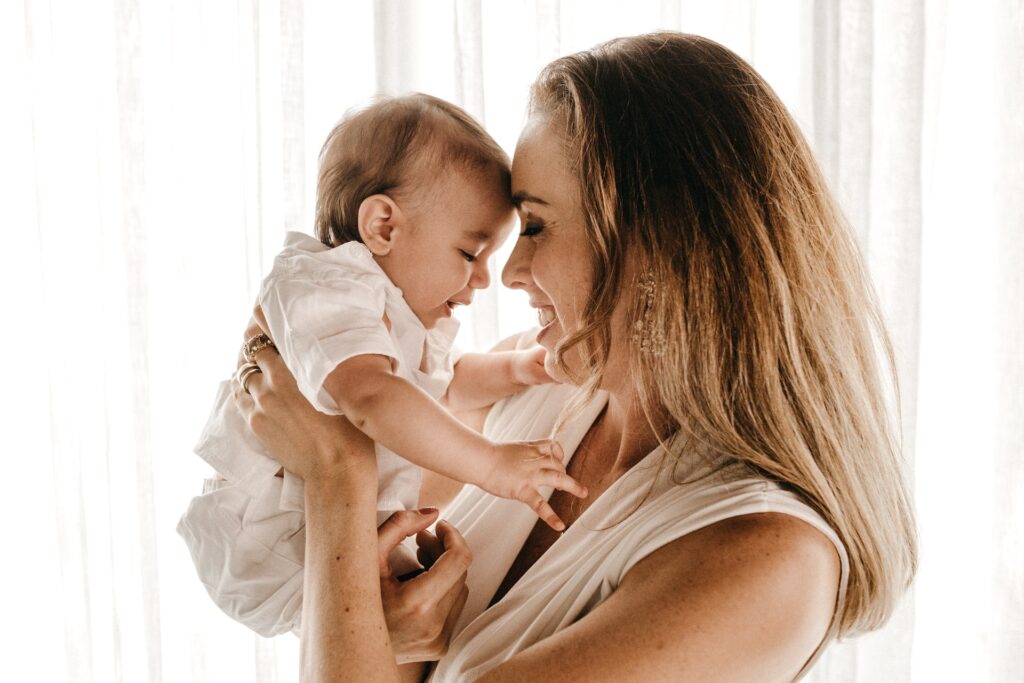
What We Can Learn from Masaru Ibuka and the Suzuki Method
Now, let me tell you about some interesting ideas from Masaru Ibuka and something called the Suzuki Method. Masaru Ibuka wrote a book called “Kindergarten is Too Late,” where he talks about how kids can learn so much from the world around them, especially when they’re really young. He says it’s super important for kids to hear lots of music from the very start. One chapter of the book discusses the concept that babies can develop a bad ear for music if they frequently hear off-tune singing, even if it’s from their mothers singing popular melodies. However, Masaru Ibuka, citing his friend Suzuki’s discovery, suggests that exposing a child to high-quality musical recordings can help in developing a good ear for music, improving their sense of pitch and rhythm. This idea is rooted in the belief that early childhood is a critical period for auditory development, and high-quality musical experiences can have a lasting positive impact on a child’s musical abilities.
The Suzuki method itself is centered around the belief that every child has the ability to learn and excel in music (and other areas) if properly nurtured and taught from an early age, in a supportive, enriching environment. The Suzuki Method, created by Shinichi Suzuki, which shows us that kids learn music naturally, just like they learn to talk — by listening, copying, and practicing.
What both of these teach us is pretty cool: you don’t have to be a perfect musician to help your child. Just playing music at home, especially good recordings of all sorts of songs and tunes, can do wonders. They both believed that being surrounded by music helps kids pick up musical skills easily and joyfully. It’s like giving your child a box of musical treasures. They’ll learn to love all the different sounds, which helps them get better at understanding and making music themselves.
So, to all the parents out there, remember: your voice and the music you share with your child are gifts. They won’t remember if you missed a note here or there. But they will remember the love, the fun, and the magic of music you brought into their lives. Let’s make some music together!
Is Musical Ability Inherited?
So, you’re worried that because you can’t carry a tune, your child won’t be able to either? It’s a common concern among parents. The big question on many minds is, “Is singing talent inherited?” While it’s true that genetics can play a role in musical ability, it’s far from the whole story. The debate of nature vs. nurture in music education is ongoing, but one thing is clear: every child has the potential to develop musical skills.
Research suggests that while some aspects of musical talent can be genetic, the environment we create for our children plays a significant role in their musical development. Just like a seed needs the right soil to grow, children need a nurturing environment to develop their musicality. So, even if you’re not confident in your own musical abilities, you can still create a fertile ground for your child to bloom musically.
Building Bonds Through Music: Beyond Perfect Pitch
Music is a universal language that speaks to the heart. It has the power to build bridges between hearts, even when the notes aren’t perfectly aligned. Bonding through music goes beyond perfect pitch; it’s about sharing moments that touch our emotions and strengthen our connections with our little ones.
Singing with children, dancing around the living room, or just listening to a beautiful melody together can have profound emotional benefits. These activities provide a sense of security and belonging, nurture emotional intelligence, and create joyful memories that last a lifetime. It’s these shared experiences, not the precision of the notes, that deepen the bond between parent and child.
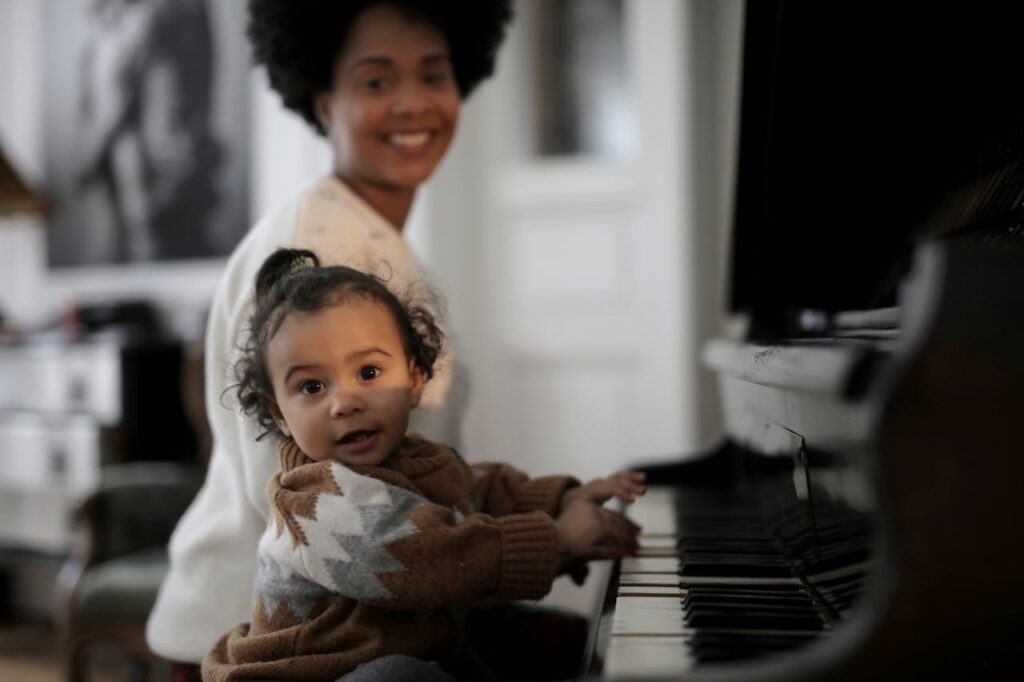
Easy Ways to Fill Your Home with Music
Feeling a bit out of your depth when it comes to musical education for children? Worry not! Here are some actionable tips to help you enrich your child’s musical environment, no conservatory degree required.
- Explore Different Genres: Create playlists with a variety of genres. From classical to folk, jazz to pop, soothing lullabies to exciting movie soundtracks, exposing your child to different types of music can broaden their musical horizons and appreciation. This way, your child can experience the wide, wonderful world of music.
- Music as a Background Friend: Let those playlists run while your child is playing. This background music becomes a friendly, comforting presence in their daily adventures.
- Live Music Adventures: If you can, go to live concerts that are kid-friendly. There’s something magical about experiencing music as it’s being played right in front of you.
- Use High-Quality Music Recordings: While live music is great, high-quality recordings can also provide a rich musical experience. Services like Spotify, YouTube, Apple Music, and Amazon Music offer vast libraries of music from around the world.
- Sing to Your Child: Don’t worry about how good you sound. Your child loves your voice just because it’s yours. Singing lullabies, playful ditties, or even making up your own songs together can be a wonderful way to connect.
- Discover Music Together: Watch videos showing different musicians and instruments. It’s like taking a musical trip around the world from your living room. Seeing and hearing different instruments and styles sparks curiosity and excitement.
- Lullabies Before Bed: Play recordings of gentle lullabies as part of the bedtime routine. It’s a soothing way to end the day, filled with sweet dreams of melodies.
- Make Music a Part of Daily Life: Incorporate music into everyday activities. Play upbeat songs during playtime, soothing melodies at bedtime, and sing along to fun tunes while doing chores together.
- Musical Playdates: Organize playdates with a musical twist. Encourage children to bring their favorite instruments, or create simple ones together, and explore sounds and rhythms as a group.
Remember, choosing music that’s gentle and melodic is usually more enjoyable for little ears. Save the heavy, loud stuff for later years.
Just by Enjoying Music, You’re Doing Great
When it comes to nurturing your child’s musical journey, your enthusiasm and engagement are more valuable than your ability to hit every note perfectly. By making music a joyful and integral part of your family life, you’re setting the stage for a lifelong appreciation of music and a stronger family bond.

The Journey of Learning Together: Parents and Children Growing Musically
One of the most beautiful aspects of music is its ability to grow with us. As parents, stepping into the world of music alongside your children opens up an avenue for mutual learning and growth. Imagine sitting down together for parent-child music lessons, whether it’s tinkering with a piano, strumming a guitar, or simply singing along to favorite tunes. This shared learning experience not only strengthens your bond but also shows your child that it’s okay to be a beginner and that there’s joy in learning at any age.
Sharing musical progress, celebrating small victories, and even laughing over the not-so-perfect attempts are all part of this journey. It encourages a mindset of continuous improvement and mutual support, which are invaluable life lessons. Remember, it’s not just about learning to sing or play an instrument together; it’s about the shared moments of joy, frustration, and triumph.
Diverse Musical Exposure: The Key to Cultivating Musicality
Exposing children to a wide range of musical genres and instruments is akin to giving them a palette with endless colors. From the soothing strains of classical music to the vibrant beats of world music, each genre offers unique sounds, stories, and emotions. Exploring diverse music together not only cultivates a rich musicality in children but also fosters an open-minded appreciation for the world’s cultures and histories.
This exposure can be as simple as playing different genres at home, attending various live performances, or even exploring the sounds and histories of instruments from around the globe. Such experiences enrich children’s musical understanding and appreciation, laying a foundation for a lifelong love of music.
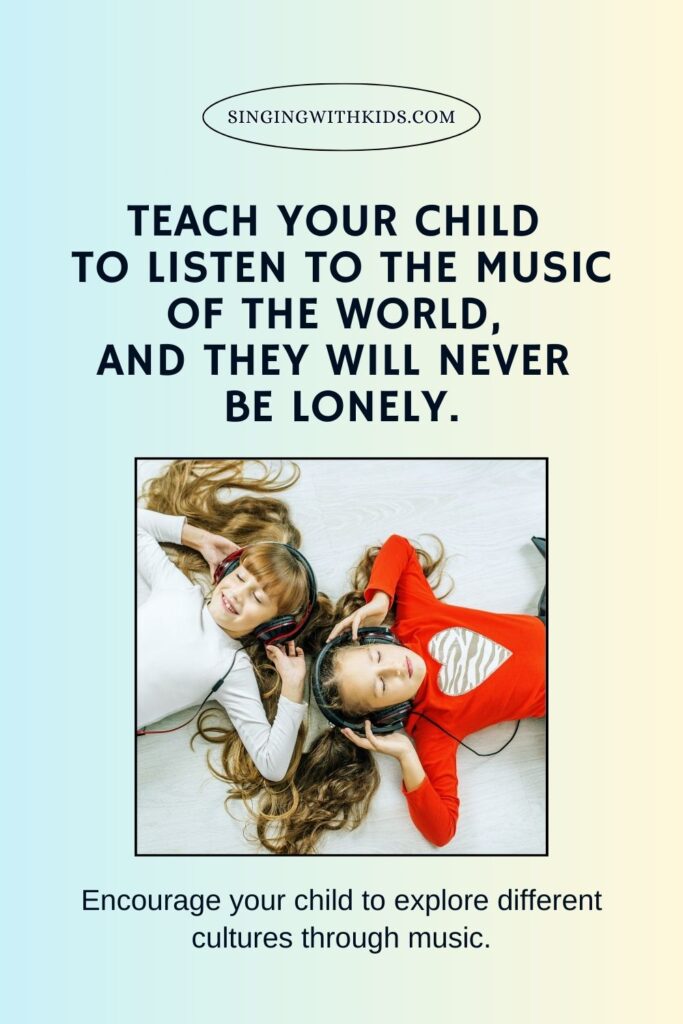
Overcoming Hesitations: Every Voice is Beautiful in Its Own Way
To all the parents hesitating at the edge of their musical journey, remember: every voice is beautiful in its unique way. Music is an expression of the soul, not a competition for perfection. Embracing your musical imperfections can teach your child a powerful lesson about authenticity and self-acceptance.
So, let go of the fear of not being good enough. Sing out of tune, miss a few notes on the piano, and let your genuine love for music shine through. After all, the most important message you can give your child is that it’s okay to be yourself, to try new things, and to enjoy the process, regardless of the outcome.
As we conclude this musical exploration, I invite you to share your journey, experiences, and tips in the comments below. Have you discovered a new genre together? Perhaps found a fun way to integrate music into your daily routines? Let’s create a community of musical families, connecting through our shared stories and inspiring each other to weave more music into our lives.
And if this post has struck a chord with you, please share it with friends and family. You never know who might be looking for a sign to start their own family musical adventure.
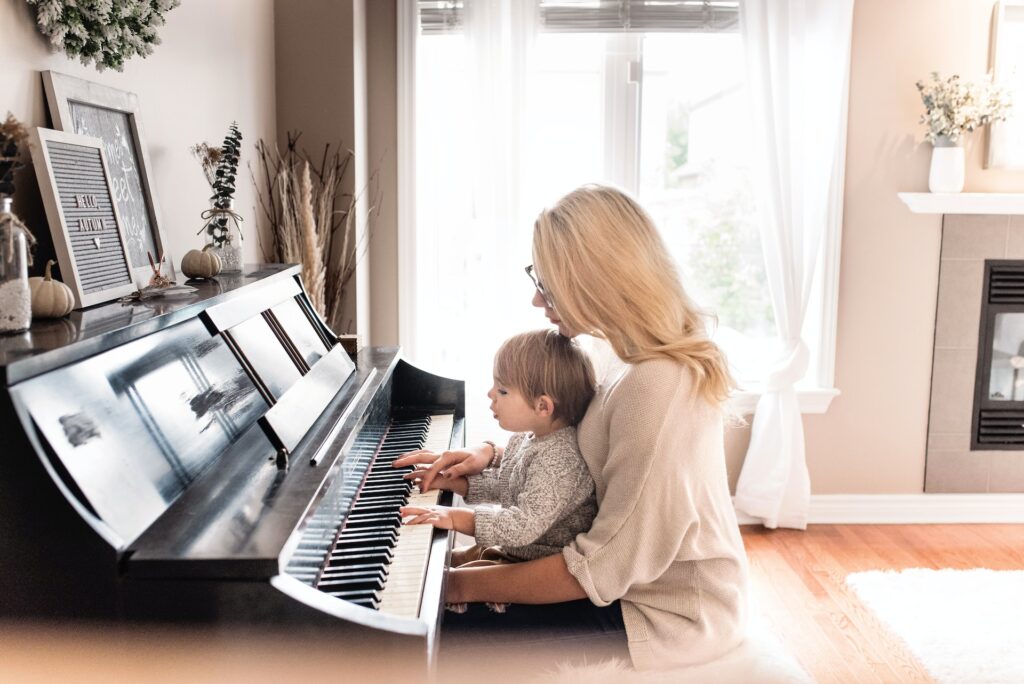
Music is a gift that keeps on giving, enriching our lives and the bonds we share with our loved ones. So, grab an instrument, hit play on your favorite playlist, or simply hum a tune — and let the musical journey with your child begin.

